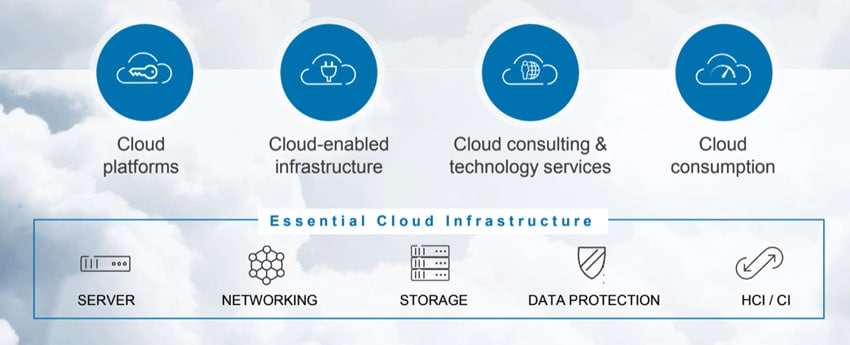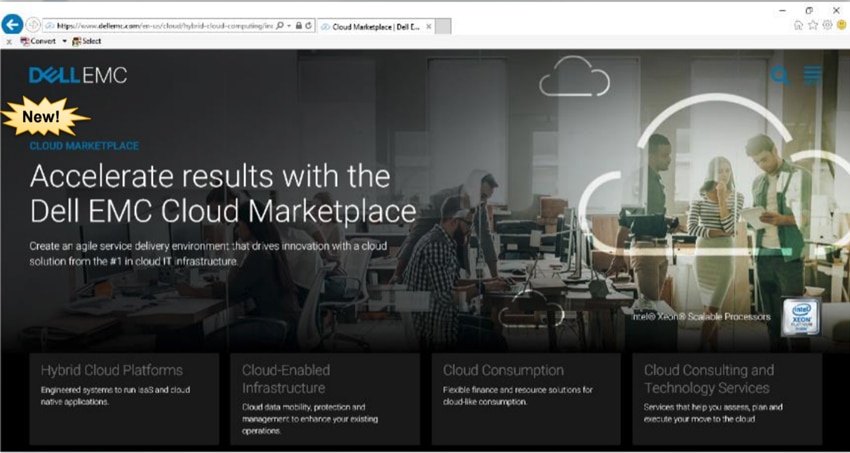
Today at VMworld 2018, Dell EMC announced several enhancements to its broad cloud-enabled infrastructure solutions portfolio. Customers are adopting multi-cloud environments more and more and are looking for ways to maximize their investments in this area. The enhancements announced today aim to tackle the entire scope of applications that run in a multi-cloud world.
It has become almost cliché to point out how fast society as a whole it accumulating data. Not only has it exploded over the last decade due to mobile computing, AI, ML, and IoT will push its rate of growth even higher. Due to all of this data and all the different ways it is generated and used, multiple options for storing and using it have to be leveraged. The cloud has revolutionized how data is both stored and used however there isn't a one size fits all solution (yet), which brings us to the multi-cloud era. And this means organizations will need tools to help them function in this new era.
To help users with the struggle Dell EMC is offering pre-engineered solutions that include IaaS with VMware for traditional applications; platform-as-a-service (PaaS) architecture and containers with Pivotal for cloud-native applications; an enterprise-class public cloud platform with Virtustream; and, Azure services on-premises with Microsoft Azure Stack. The above solutions can help companies accelerate time to results while simplifying operations and improving efficiencies.
A big part of Dell EMC's path to the software-defined data center (SDDC) is its VxRail and VxRack HCI solutions. VxRack SDDC now has new features including the VMware SDDC software suite pre-integrated on a wide range of VxRail hardware. SDDC manager now has automation and serviceability extensions. VxRail now has the option of VMware Validated Designs to support distributed multi-availability zones architecture and multi-site deployments with disaster recovery. VxRail will now be integrated with the new VMware Cloud Assembly SaaS based cloud management solution to further speed time to value.
Dell EMC is rolling out more cloud-enabled infrastructure. This new infrastructure is set to address emerging technologies such as AI and IoT and is central to the companies innovations and investments. The new infrastructure and capabilities include:
- Cloud Data Mobility enables organizations to move data to and from cloud storage seamlessly, providing the flexibility to augment on-premises data storage with cloud-based storage. Updates to the Data Domain Cloud Tier for long-term retention help further reduce transactional overhead by increasing the object size written to the cloud. Dell EMC also has improved data storage utilization by way of tight integration with Virtustream Storage Cloud and Dell EMC Elastic Cloud Storage.
- Cloud Data Protection protects data residing on various cloud platforms. Dell EMC Data Domain Cloud DR has been enhanced for application-consistent cloud disaster recovery in AWS, as well as recovery to VMware Cloud on AWS. Dell EMC Cloud Snapshot Manager provides backup and recovery for public cloud workloads, and now offers protection for Microsoft Azure. VMware vCloud Director features a new data protection extension that now enables cloud service providers to offer an integrated VMware and Data Protection self-service solution to customers. Additionally, Dell EMC Data Protection Suite was named an Advanced Technology Partner in the Amazon Web Services (AWS) Partner Network and a Microsoft Partner Gold Competency in Cloud Platforms.
- Cloud Control allows environments to be managed from anywhere. Powered by machine learning, CloudIQ, a free cloud-based application that allows users to proactively track storage health, predict capacity shortages and detect performance anomalies, is now introducing support for PowerMax, VMAX, and XtremIO. This support is in addition to Dell EMC Unity and SC Series. New VMware integration provides virtual machine-level performance and capacity insights, and new mobile apps provide access to CloudIQ from anywhere.
- Cloud Data Services – features comprehensive data services spanning all file types for applications running in the cloud, including Isilon Cloud for Google Cloud Platform, Elastic Cloud Storage and Virtustream Storage Cloud. Unity Cloud Edition is the latest addition to this family, offering a fully-featured software-defined unified storage deployed in the cloud. These capabilities enable users to easily deploy Dell EMC unity block and file storage with VMware Cloud on AWS. Additionally, users can leverage the flexibility of cloud deployment to support disaster recovery and as-needed operational demands, including test and development, and data analytics.
An area where Dell EMC tends to stand out (at least with some of the customers we've spoken to) is with some of the consulting and technology services. The company is taking its reputation for these services and extending it to the cloud. These consulting services will help customers create roadmaps, profile applications, implement cloud management and automation platforms and transition to a cloud operating model. As with other Dell EMC Managed Services, experts are available around the clock to help ensure optimal system performance and minimize downtime.
To make it easier for customers to find everything they need as it relates to the cloud and Dell EMC, the company has launched the Dell EMC Cloud Marketplace. As one would expect, this marketplace offers customers a choice of cloud platforms, enhanced cloud-enabled infrastructure capabilities, as well as consulting and technology services, and consumption models in a self-service portal.
Sign up for the StorageReview newsletter



